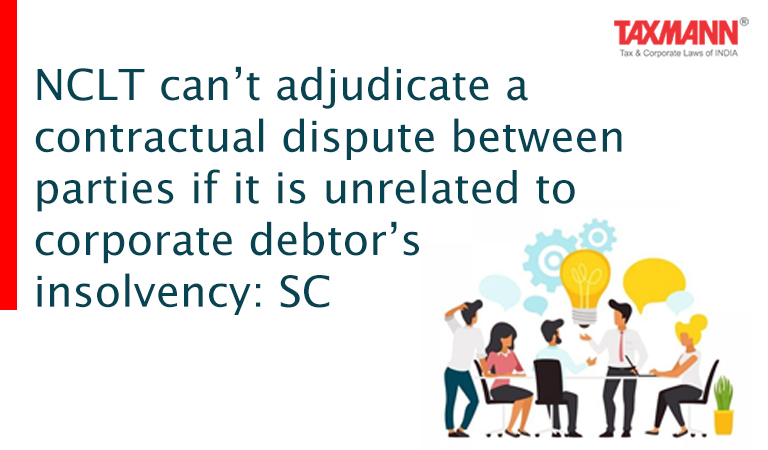NCLT can’t adjudicate a contractual dispute between parties if it is unrelated to corporate debtor’s insolvency: SC
- News|Blog|Insolvency and Bankruptcy Code|
- 2 Min Read
- By Taxmann
- |
- Last Updated on 25 November, 2021

Case Details: TATA Consultancy Services Ltd v. Vishal Ghisulal Jain, Resolution Professional, SK Wheels (P.) Ltd. - [2021] 132 taxmann.com 232 (SC)
Judiciary and Counsel Details
-
- Dr. Dhananjaya Y. Chandrachud and A.S. Bopanna, JJ.
Facts of the Case
In the instant case, the Corporate Debtor initiated a miscellaneous application before the NCLT under Section 60(5)(c) of the IBC for quashing of a contract termination notice.
The NCLT passed an order granting an ad-interim stay on the termination notice issued by the appellant and directed the appellant to comply with the terms of the Facilities Agreement. The NCLT observed that prima facie it appeared that the contract was terminated without serving the requisite notice of 30 days. The NCLAT dismissed the appeal filed against NCLT’s order.
On further appeal, the issues that arose for consideration before the Apex Court were as under:
(a) Whether the NCLT can exercise its residuary jurisdiction under Section 60(5)(c) of the IBC to adjudicate upon the contractual dispute between the parties; and
(b) Whether in the exercise of such a residuary jurisdiction, it can impose an ad-interim stay on the termination of the Facilities Agreement?
Supreme Court Held
Setting aside the NCLAT order, the Supreme Court observed that the residuary jurisdiction of the NCLT under section 60(5)(c) of IBC cannot be invoked to adjudicate contractual dispute between the parties.
Supreme Court viewed that the NCLT does not have any residuary jurisdiction to entertain the present contractual dispute which has arisen dehors the insolvency of the Corporate Debtor. In the absence of jurisdiction over the dispute, the NCLT could not have imposed an ad-interim stay on the termination notice. The NCLAT has incorrectly upheld the interim order of the NCLT.
Disclaimer: The content/information published on the website is only for general information of the user and shall not be construed as legal advice. While the Taxmann has exercised reasonable efforts to ensure the veracity of information/content published, Taxmann shall be under no liability in any manner whatsoever for incorrect information, if any.

Taxmann Publications has a dedicated in-house Research & Editorial Team. This team consists of a team of Chartered Accountants, Company Secretaries, and Lawyers. This team works under the guidance and supervision of editor-in-chief Mr Rakesh Bhargava.
The Research and Editorial Team is responsible for developing reliable and accurate content for the readers. The team follows the six-sigma approach to achieve the benchmark of zero error in its publications and research platforms. The team ensures that the following publication guidelines are thoroughly followed while developing the content:
- The statutory material is obtained only from the authorized and reliable sources
- All the latest developments in the judicial and legislative fields are covered
- Prepare the analytical write-ups on current, controversial, and important issues to help the readers to understand the concept and its implications
- Every content published by Taxmann is complete, accurate and lucid
- All evidence-based statements are supported with proper reference to Section, Circular No., Notification No. or citations
- The golden rules of grammar, style and consistency are thoroughly followed
- Font and size that’s easy to read and remain consistent across all imprint and digital publications are applied



 CA | CS | CMA
CA | CS | CMA
